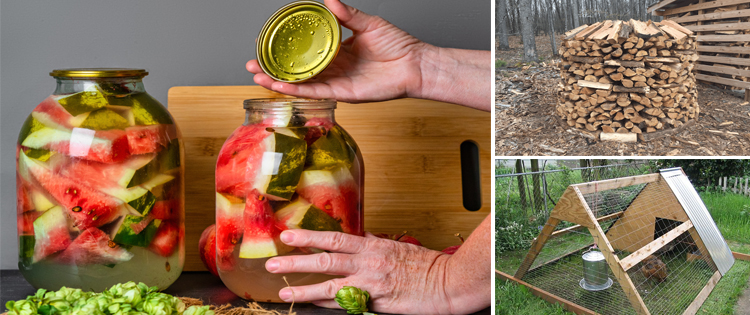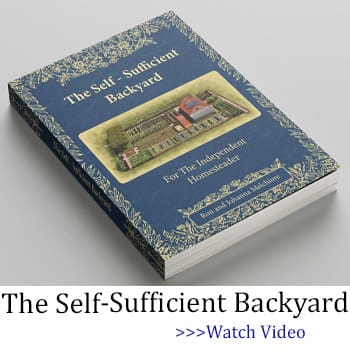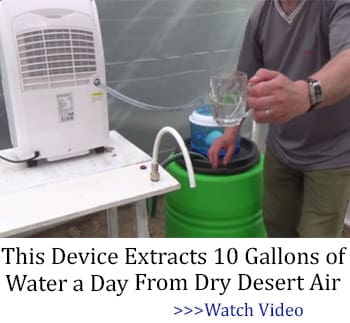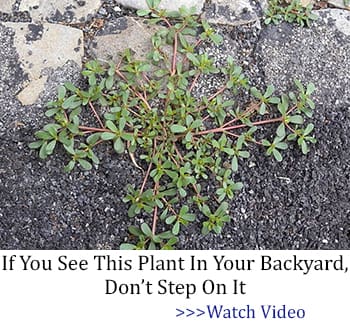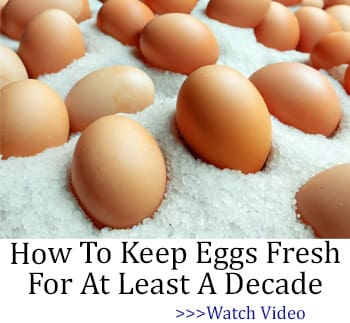There are so many things to do throughout the year as a homesteader, that you need a to-do list to ensure you don’t miss anything out. What you need to do in January will differ significantly from what you need to do in March. You can’t afford to let chores pile up or you’ll end up flustered and frustrated which defeats the purpose of being a homesteader. July is an awesome time of year to be outside, the sun is shining, the sky is blue and everyone’s got a genuine smile on their face. The problem is that when the sun is out in all its glory, we can get into vacation mode and find ourselves relaxing on the porch with a glass of freshly squeezed juice instead of getting stuff done. There’s nothing wrong with enjoying the weather, just make sure you do it when the work is done. Keep reading to find out what you need to do around your homestead in the month of July.
Food Preservation
Food preservation is a great way to avoid food waste and save money. Homesteaders will always have more fruit and vegetables than they can eat, additionally, there are some fruits and vegetables that are seasonal and you won’t get to eat them during the fall and winter months. But with a food preservation technique such as canning, you will have all your favorite foods available to you all throughout the year. There are three main canning methods, water bath canning, pressure canning, and atmospheric canning. This website will tell you everything you need to know about canning. Some of the summer fruits and vegetables to can during the summer months include:
- Watermelon
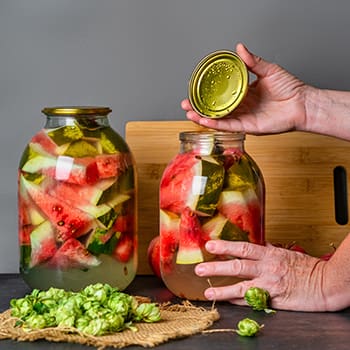
- Tomatoes
- Pickles
- Strawberries
- Plums
- Raspberry
- Okra
- Cherries
- Blackberries
- Beets
- Apples
Freezing is another way to preserve food. Simply transfer the fruits and vegetables into freezer bags, and label them with the type of food and date. You can store fruits and vegetables in the freezer for between six to nine months.
Check Animals For Health Issues
Animals suffer from a lot of health issues during summertime. You should particularly look out for mites and flystrike during the summer. If you’re not familiar with mites, they will infiltrate your chicken coop and infest your chickens. They can seriously damage your chicken’s health and cause them to become very miserable. You should also keep an eye out for chicken lice.
Although rabbits typically suffer from flystrike, they can also infect other animals. To prevent flystrike, make sure your animals are living in the cleanest conditions possible.
During the summer, you will also need to check your animal’s hindquarters to ensure they have no maggots hiding in their skin. Additionally, make sure all areas are kept dry because flies are attracted to moisture.
Worm Your Animals
When your eggs come out with more poop on them than usual, you’ll know it’s time to worm your chickens. I find that this typically happens during the summer. I go around and worm the rest of the animals too.
Treat Pests
The pests come out during summertime, so to make sure they don’t ruin your crops, you’ll need to keep them under control. One way to do this is to plant herbs and plants that scare off pests. Here are some examples:
- Basil: Repels whitefly, mosquitoes, flies, carrot fly, and asparagus beetle.

- Calendula: Repels tomato hornworm, nematodes, and asparagus beetle.
- Borage: Repels tomato hornworm, and imported cabbageworm.
- Catmint: Repels Squash bugs, Japanese beetle, flea beetle, cucumber beetle Colorado potato beetle, cabbage looper, and aphids.
- Dill: Repels spider mites and cabbage moths.
- Chives: Repels Japanese beetles and aphids.
- Mint: Repels ants, whiteflies, squash bugs, flea beetles, cabbage moths, and aphids.
Weed the Garden
Weeding is probably my least favorite job, but if it doesn’t get done, they’ll take over your garden and you don’t want that. Prevention is always better than cure so it’s best to get it out of the way now. Additionally, make sure you weed your flower beds. Unfortunately, embedded within those pretty flowers are weeds, and if you want your flower beds to retain their beauty, you’ll need to get rid of the weeds quickly. If you’ve got weeds growing out of paved areas, I’ve also found that it helps to make my own weed killer. Although it is not as potent as the store-bought chemical-riddled kind, homemade weed killer will work for you if you work it. The best weed killer recipe I’ve found is to mix two parts white vinegar, one part baking soda, and the juice from two lemons. Shake the mixture up, pour it over the weeds sticking out of your pavements, wait for twenty-four hours, and then sweep them up.
Keep the Lawn Trimmed
Grass grows quickest during the summer, and an overgrown lawn spoils the whole garden. Your homestead isn’t just a place where you grow food and rear animals, it’s where you live, and it should look presentable at all times. You should make even more of an effort to keep your lawn trimmed when the weather is warmer because you’ll be spending more time outside.
Start Seeding For Fall
If you want to grow a fall garden, you’ll need to start seeding during the summer months. While it’s true that spring is the best time for planting, summer also has its benefits. For example, crops such as turnip, cabbage, chard, lettuce, and parsley prefer the cool weather when they’re above ground, but they prefer warmer temperatures during germination. Get planting now while the soil is warm, and they’ll mature in the fall and winter months.
Wood Storing
If you don’t want to catch yourself short of firewood during the winter months, store it all throughout the year. Summer is the best time to go out and gather wood because it’s warm, so take advantage of this time of the year. There are plenty of opportunities to find wood, you’ve just got to look for them. Ask friends, family, and neighbors who may have cut down some trees and need the wood removed. Or take a trip to your local sawmill and ask if they’ve got any spare slabs.
Final Thought
As mentioned, it’s easy to fall into relax mode when the sun is shining, but the quicker you get stuff done, the more time you’ll have to enjoy the sun. There is absolutely nothing wrong with taking a break, in fact, I encourage you to go on vacation. The more you look after yourself, the easier it will be to look after your homestead. So take some time off, come back with a renewed soul and start preparing for fall.
You may also like:
If You See This Plant in Your Backyard, Burn It Immediately! (Video)
Survival DIY Projects You Can Start on Your Property Right Now
How To Repurpose Old Items Into New Projects For Your Backyard
